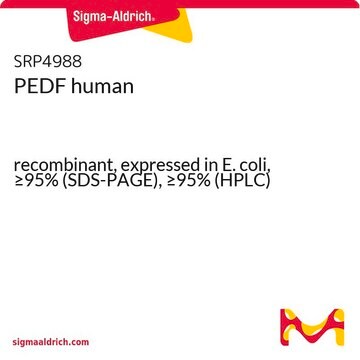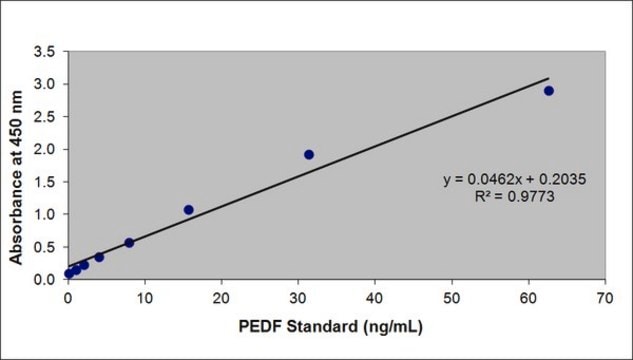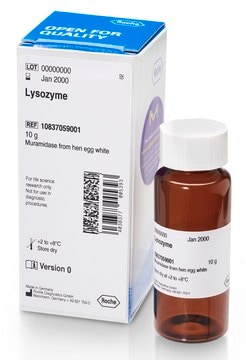GF134
Pigment Epithelium Derived Factor Protein, Recombinant human
The Pigment epithelium-derived factor (PEDF) was first identified as a 50 kDa secreted protein in conditioned medium from cultured fetal human retinal pigment epithelium (RPE) cells (Tombran-Tink et al., 1991).
Synonym(s):
PEDF
Sign Into View Organizational & Contract Pricing
All Photos(1)
About This Item
UNSPSC Code:
12352202
eCl@ss:
32160405
NACRES:
NA.75
Recommended Products
biological source
human
Quality Level
assay
>95% (SDS-PAGE)
form
liquid
manufacturer/tradename
Chemicon®
NCBI accession no.
UniProt accession no.
shipped in
dry ice
General description
Pigment epithelium-derived factor (PEDF) was first identified as a 50 kDa secreted protein in conditioned medium from cultured fetal human retinal pigment epithelium (RPE) cells (Tombran-Tink et al., 1991). PEDF has been shown to have neurotrophic activity in the retina in vivo (Cayouette et al., 1999). PEDF is also a neurotrophic and neuroprotective factor in other systems, including cultured cerebellar granule cells, primary hippocampal neurons, spinal cord motor neurons and amphibian photoreceptors cultured in the absence of RPE cells (Karakousis, et al., 2001). The binding of PEDF to retinoblastoma and cerebellar granule cells may be receptor-mediated. Recently, PEDF was shown to be a potent inhibitor of angiogenesis in endothelial cell cultures and in rat cornea and retina in vivo (Dawson et al., 2001; Stellmach et al., 2001).
Product Source: Stable BHK (baby hamster kidney) cell transfectants
Physical form
Provided liquid in 20 mM sodium phosphate, pH 6.4, 0.2 M sodium chloride, and 1 mM DTT. Product has been sterile filtered to 0.22-micron.
Preparation Note
Product may be rendered sterile by 0.22-micron filtration.
Storage and Stability
Maintain frozen at -70°C in undiluted aliquots for up to 6 months from date of receipt. Avoid repeated freeze/thaw cycles.
.
.
Analysis Note
PEDF is purified via affinity purification from culture supernatants
Legal Information
CHEMICON is a registered trademark of Merck KGaA, Darmstadt, Germany
Disclaimer
Unless otherwise stated in our catalog or other company documentation accompanying the product(s), our products are intended for research use only and are not to be used for any other purpose, which includes but is not limited to, unauthorized commercial uses, in vitro diagnostic uses, ex vivo or in vivo therapeutic uses or any type of consumption or application to humans or animals.
Storage Class
12 - Non Combustible Liquids
wgk_germany
WGK 2
flash_point_f
Not applicable
flash_point_c
Not applicable
Certificates of Analysis (COA)
Search for Certificates of Analysis (COA) by entering the products Lot/Batch Number. Lot and Batch Numbers can be found on a product’s label following the words ‘Lot’ or ‘Batch’.
Already Own This Product?
Find documentation for the products that you have recently purchased in the Document Library.
M Cayouette et al.
Neurobiology of disease, 6(6), 523-532 (1999-12-22)
Pigment epithelium-derived factor (PEDF) is a member of the serine protease inhibitor superfamily produced by retinal pigment epithelial cells in the developing and adult retina. In vitro, it induces neuronal differentiation of retinoblastoma cells and promotes survival of cerebellar granule
N M Dawson et al.
Synapse (New York, N.Y.), 39(1), 70-81 (2000-11-09)
Our earlier work has shown that repeated administration of classical neuroleptic drugs gives rise to structural alterations in target regions of the mesolimbic pathway, most notably, nucleus accumbens. Such changes could be responsible for the efficacious or motor side effects
Wai T Wong et al.
Molecular vision, 10, 837-844 (2004-11-18)
Pigment epithelium derived factor (PEDF) is a secreted protein with demonstrated anti-angiogenic properties, and with potential application for the treatment of neovascular disease. Delivery of pigment epithelium derived factor to the retina via virus mediated gene transfer has been shown
P C Karakousis et al.
Molecular vision, 7, 154-163 (2001-07-05)
To localize pigment epithelium-derived factor (PEDF) in developing and adult human ocular tissues. PEDF was localized in fetal and adult eyes by immunofluorescence with a polyclonal antibody (pAb) against amino acids 327-343 of PEDF, or a monoclonal antibody (mAb) against
Our team of scientists has experience in all areas of research including Life Science, Material Science, Chemical Synthesis, Chromatography, Analytical and many others.
Contact Technical Service







